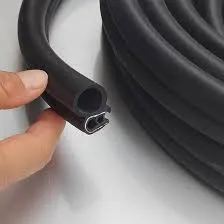CE Certification for Sponge Rubber Seals in Industrial Applications and Standards Compliance
ಆಗಸ್ಟ್ . 17, 2024 19:09 Back to list
CE Certification for Sponge Rubber Seals in Industrial Applications and Standards Compliance
Understanding CE Certification for Sponge Rubber Seals
Sponge rubber seals are essential components used in various industries for sealing applications. Their primary function is to prevent the ingress of dust, moisture, and other environmental factors, ensuring the efficiency and longevity of machinery and equipment. With the increasing use of these seals across Europe and beyond, the importance of CE certification has become a focal point for manufacturers and consumers alike.
What is CE Certification?
CE Certification is a standard that signifies conformity with health, safety, and environmental protection standards for products sold within the European Economic Area (EEA). The CE marking indicates that a product has been assessed and meets EU safety, health, and environmental protection criteria. For sponge rubber seals, this certification is crucial because it ensures that the products can be safely used in various applications, from automotive to construction and home appliances.
Importance of CE Certification for Sponge Rubber Seals
1. Safety Assurance CE certification ensures that sponge rubber seals are manufactured to meet stringent safety standards. This is vital as inadequate sealing can lead to equipment failure, accidents, and environmental hazards.
2. Quality Standards The certification process evaluates the quality of materials used in seals, ensuring they are durable and efficient. This is particularly important for industries such as automotive, where performance and reliability are critical.
3. Market Access For manufacturers, having CE certification can open doors to European markets. Products bearing the CE mark can be sold in the EEA without additional barriers, allowing companies to broaden their customer base.
4. Consumer Trust For businesses sourcing sponge rubber seals, CE certification adds a layer of credibility. Knowing a product meets established standards reassures consumers and manufacturers about the reliability and safety of the seals they are purchasing.
5. Regulatory Compliance Adhering to CE certification helps companies avoid legal ramifications that may arise from non-compliance with EU regulations. This protects businesses from potential fines or restrictions on their products.
The Certification Process
ce cetification sponge rubber seal

To achieve CE certification, manufacturers must follow a series of steps
1. Product Assessment Manufacturers must first conduct a thorough risk assessment of their sponge rubber seals, determining potential hazards and compliance requirements.
2. Testing The seals undergo rigorous testing in accredited laboratories to ensure they meet the necessary EU standards.
3. Documentation Manufacturers must compile a technical file that documents the compliance process, including test results and quality control measures.
4. Declaration of Conformity Once the product meets all necessary requirements, the manufacturer issues a Declaration of Conformity, stating that the seal complies with the relevant EU directives.
5. Affixing the CE Mark Finally, the CE mark can be affixed to the product, indicating its compliance for sale within the EEA.
Challenges in CE Certification
While CE certification is essential, the process can be complex and time-consuming. Manufacturers may face challenges in understanding the relevant directives, preparing the necessary documentation, and ensuring adequate testing. Additionally, keeping up with evolving regulations can add to the difficulty.
Conclusion
In summary, CE certification plays a vital role in the manufacturing and use of sponge rubber seals. By ensuring compliance with safety, quality, and environmental standards, the certification fosters consumer trust, promotes market access, and enhances product quality. For manufacturers, navigating the certification process may pose challenges, but the benefits of CE certification far outweigh the difficulties, ultimately leading to safer and more reliable sealing solutions in various applications.
-
High-Performance Oil Filter H F123 Kawasaki KL250-KLX650 | Engine Protection
NewsAug.05,2025
-
Replacement Filter Screen for Karcher SE3001 SE2001 Vacuum
NewsAug.04,2025
-
Karcher A2004 Vacuum Cartridge Filter Replacement - Durable & Efficient
NewsAug.03,2025
-
Karcher WD/MV HEPA Cartridge Filters | Dust Control Experts
NewsAug.02,2025
-
Top Window Seal Strip Adhesive Companies | Strong Weatherproofing
NewsAug.01,2025
-
Premium Oil Filter for Can-Am Outlander 2003-2017 420256188
NewsJul.31,2025
